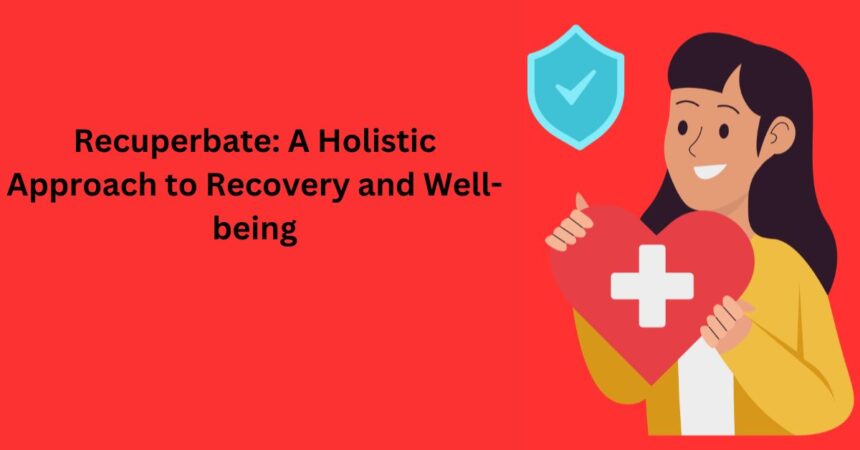Introduction
In today’s fast-paced world, recovery and recuperation are more important than ever. The term “recuperbate” refers to the process of actively engaging in recovery, whether from illness, injury, stress, or strenuous activities. Unlike passive rest, recuperbate encompasses a holistic approach to healing, integrating physical, mental, and emotional well-being strategies.
This article delves deep into the meaning of recuperbate, its benefits, practical strategies, and how it differs from traditional recovery methods. It also explores scientific insights, potential risks, and expert recommendations to help you maximize your recuperation process.
What is Recuperbate?
Recuperbate is derived from the word “recuperate”, which means to recover. However, unlike traditional recovery methods that often involve passive rest, recuperbate encourages an active participation in healing. This concept includes various techniques such as:
- Nutrition optimization
- Physical rehabilitation
- Mindfulness and mental resilience
- Alternative therapies (e.g., acupuncture, meditation, massage)
- Lifestyle adjustments for long-term well-being
The Science Behind Recuperbate
Scientific research has shown that active recovery strategies can significantly enhance the healing process. Some key findings include:
- Movement-based recovery (e.g., yoga, light stretching) improves circulation and reduces muscle soreness.
- Proper nutrition plays a crucial role in tissue repair and immune system strengthening.
- Mental health techniques, such as meditation and deep breathing, help reduce stress, which can accelerate physical healing.
- Quality sleep is essential for cell regeneration and overall wellness.
Key Benefits of Recuperbate
1. Faster Recovery from Illness and Injury
Actively engaging in recovery techniques can reduce downtime and promote quicker healing. Proper hydration, nutrition, and targeted exercises help the body repair itself more efficiently.
2. Enhanced Physical Performance
Athletes and fitness enthusiasts can benefit from recuperbate by incorporating active rest techniques, which allow their bodies to recover without losing mobility or strength.
3. Improved Mental Well-being
Since recuperbate involves mindfulness and stress management, it has a profound impact on mental health. Meditation, breathing exercises, and relaxation techniques help manage anxiety and depression.
4. Long-Term Health Benefits
Rather than focusing on short-term recovery, recuperbate integrates lifestyle changes that promote sustained wellness, preventing chronic health conditions in the future.
How to Incorporate Recuperbate into Your Routine
1. Nutrition and Hydration
- Consume anti-inflammatory foods (e.g., turmeric, ginger, berries) to speed up recovery.
- Stay hydrated to flush out toxins and support cellular repair.
- Include protein-rich foods for muscle repair and strength building.
2. Physical Recovery Techniques
- Low-impact exercises like stretching, yoga, or swimming.
- Massage therapy to release muscle tension and improve circulation.
- Contrast therapy (hot and cold exposure) to reduce inflammation.
3. Mental and Emotional Recovery
- Guided meditation to reduce stress and anxiety.
- Journaling to process emotions and track recovery progress.
- Spending time in nature to enhance relaxation and overall well-being.
4. Sleep Optimization
- Maintain a consistent sleep schedule.
- Reduce screen time before bed to enhance melatonin production.
- Use relaxation techniques like deep breathing or white noise to improve sleep quality.
How Recuperbate Differs from Traditional Recovery Methods
| Aspect | Traditional Recovery | Recuperbate Approach |
|---|---|---|
| Activity Level | Passive rest | Active participation |
| Focus | Physical healing only | Holistic well-being |
| Techniques Used | Medication & bed rest | Nutrition, exercise, mindfulness |
| Mental Health Consideration | Often ignored | Integral part of recovery |
| Long-Term Effects | Temporary relief | Sustainable health benefits |
Are There Any Risks Associated with Recuperbate?
While recuperbate is generally beneficial, it is essential to be mindful of potential risks:
- Overexertion: Engaging in excessive physical recovery can lead to strain rather than healing.
- Nutritional Imbalance: Following extreme diets without professional guidance can cause deficiencies.
- Ignoring Medical Advice: Recuperbate should complement medical treatments, not replace them.
- Mental Health Struggles: If recovery becomes stressful, it might be beneficial to seek professional support.
Expert Recommendations for Effective Recuperbate
- Consult a professional before trying advanced recovery techniques.
- Listen to your body and adjust strategies based on your personal needs.
- Incorporate variety by balancing physical, mental, and emotional recovery practices.
- Track progress using a journal or an app to monitor improvement.
Top 5 Trending FAQs About Recuperbate
1. What is Recuperbate, and how does it differ from traditional recovery methods?
Recuperbate goes beyond passive rest by incorporating holistic healing strategies, including physical activity, nutrition, and mental well-being.
2. Who can benefit the most from incorporating Recuperbate into their routine?
Anyone recovering from illness, stress, injury, or strenuous activity can benefit, especially athletes, busy professionals, and individuals with chronic conditions.
3. Are there any scientific studies supporting the effectiveness of Recuperbate?
Yes! Research shows that active recovery techniques enhance physical and mental healing more effectively than passive rest alone.
4. What are the potential risks or side effects associated with Recuperbate?
Overexertion, improper diet plans, and neglecting medical advice can negatively impact the recovery process.
5. How can I get started with Recuperbate, and are there certified practitioners available?
Start by incorporating nutrition, mindfulness, and movement-based recovery into your routine. Some health professionals and therapists specialize in active recovery techniques.
Conclusion
Recuperbate is a transformative approach to recovery, emphasizing active participation, holistic well-being, and sustainable health practices. By integrating nutrition, physical activity, mindfulness, and proper rest, individuals can optimize their healing process and long-term health.
Whether recovering from an illness, overcoming stress, or enhancing athletic performance, adopting recuperbate strategies can lead to a healthier, more resilient life. Start small, stay consistent, and listen to your body’s needs for the best results!





